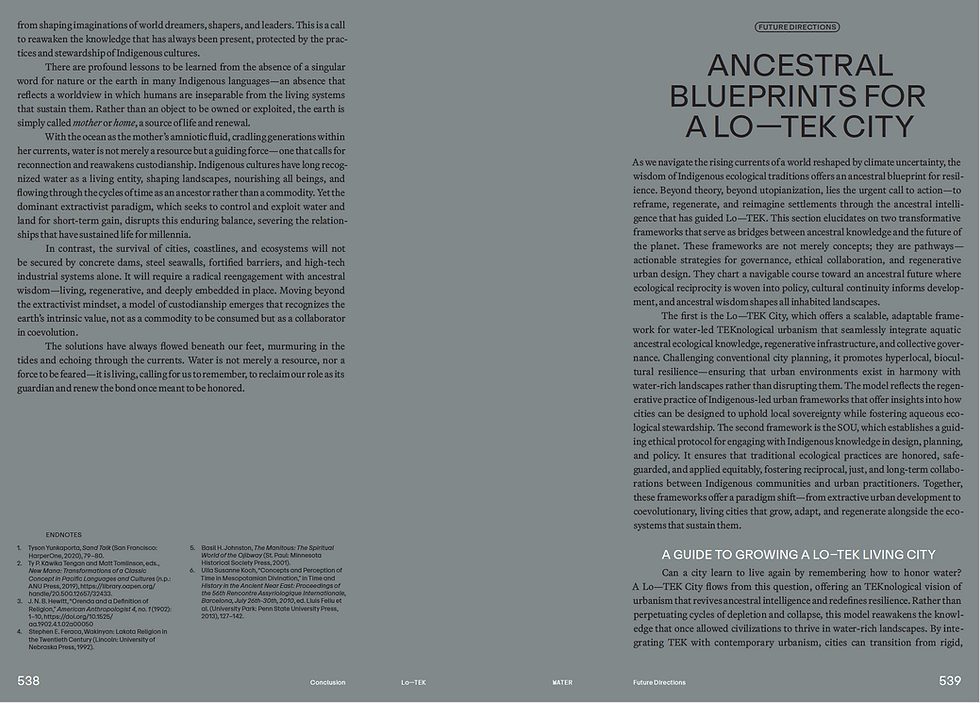Pre-Order
Lo—TEK Water
A Fieldguide for TEKnologists

This Is a Turning Point
Cities must begin to coexist rather than control.
Water must be treated as a partner, not a problem.
Design must become regenerative, or irrelevant.
Join the TEKnological renaissance.
Why This Book?
As we face intensifying floods, droughts, and rising seas,
Lo—TEK WATER offers an urgent and hopeful alternative: a TEKnological renaissance grounded in Traditional Ecological Knowledge (TEK).
This visionary volume by designer and theorist Julia Watson invites you to reimagine water not as a resource to control, but as a living intelligence—one that Indigenous communities have understood and worked with for millennia. In an age defined by artificial intelligence and industrial extraction, this book charts a return to a different kind of progress: one that regenerates, rather than dominates.
What's TEKnology?
TEKnology is a paradigm shift in how we conceive, design, and interact with nature. Emerging from the fusion of Traditional Ecological Knowledge (TEK) and contemporary design, it advances regenerative systems rooted in reciprocity rather than extraction. It reframes technology as a living relationship with nature—coadaptive, ethical, and place-based.
A TEKnologist is a practitioner who applies TEK to ecological challenges in planning, design, and management—creating systems that restore ecosystems, support cultural continuity, and foster resilience with the natural world.

What Makes
Lo—TEK WATER Different?
This isn’t nostalgia—it’s survival.
This isn’t invention—it’s listening.
From the loko i'a of the Hawaiian islands to the dike-ponds of China, and reed-insulated housing in Peru, this book reframes infrastructure as an ancestral intelligence that already knows how to adapt. Water systems that once shaped entire civilizations now offer blueprints for the future—if we pay attention.
Sneak Peak...
What’s Inside the Book?
-
Over 45 Indigenous aquatic systems across 20+ countries
-
Ecologies explored: from chinampas to floating farms, tidal fish traps to reef-based aquacultures
-
22 leading global design projects applying TEK in urbanism
-
Frameworks like the Lo—TEK City Model and the Smart Oath of Understanding (SOU)
-
Co-authored with Indigenous and traditional knowledge keepers, respecting cultural and ecological integrity
-
Global climate framework integration: IPCC, FAO, WB NBS
What You’ll Learn
-
Why ancient water infrastructures are vital to climate resilience
-
How Indigenous systems outperform modern technologies in adaptability and sustainability
-
How to dissolve the divide between ecology and innovation
-
Practical tools to embed TEK into planning, policy, and design
-
How to become a TEKnologist—and why it matters now
Who This Book Is For
-
Architects and landscape designers rethinking infrastructure
-
City planners and policy-makers working on climate adaptation
-
Environmentalists and educators teaching biocultural resilience
-
Indigenous communities protecting and evolving knowledge
-
Anyone ready to build regenerative futures—with water as teacher, not tool


Lo—TEK Water
A Fieldguide for TEKnologists
by Julia Watson
A field guide to the future of water—rooted in the ancient systems of the past.









